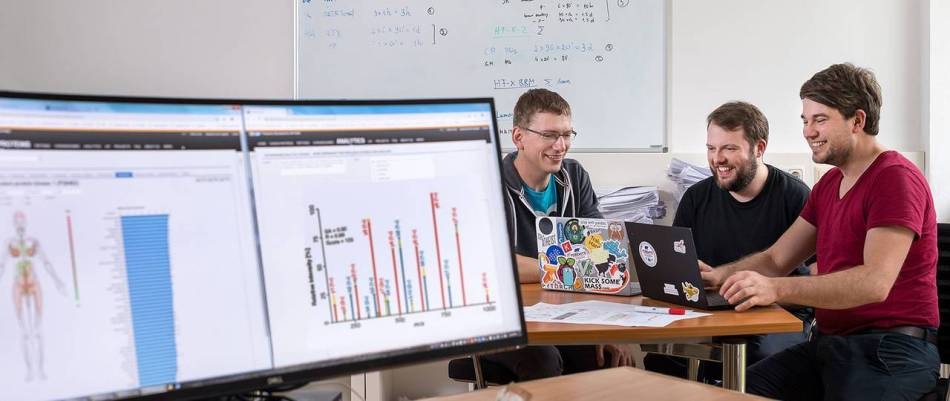May 30 2019
Artificial intelligence has allowed scientists at the Technical University of Munich (TUM), to successfully make a mass analysis of proteins from any kind of organism nearly error-free and considerably faster than before.
 The authors Mathias Wilhelm, Tobias Schmidt and Siegfried Gessulat. (Image credit: A. Eckert/TUM)
The authors Mathias Wilhelm, Tobias Schmidt and Siegfried Gessulat. (Image credit: A. Eckert/TUM)
This breakthrough method is set to bring a phenomenal change in the field of proteomics, since it can be employed in both clinical and basic research.
The genome of all kinds of organisms includes blueprints for an unlimited number of proteins, which regulate nearly all the life functions. Defective proteins are known to cause serious diseases, like dementia, cancer, or diabetes. As a result, proteins are also regarded as the most significant targets for drugs.
In order to better infer the life processes and diseases and devise more suitable treatments, many numbers of proteins have to be examined at the same time. Mass spectrometry is currently used to establish the amount and type of proteins present in a biological system. Yet, today’s techniques of data analysis continue to yield a number of errors.
Now, a research team at the Technical University of Munich has effectively used proteomic data to train a network of neurons in such a way that it can detect proteins much more rapidly and with practically no errors. The team was headed by biochemist Bernhard Küster, Professor of Proteomics and Bioanalytics at the Technical University of Munich, and bioinformatics scientist Mathias Wilhelm.
A solution to a serious problem
Proteins cannot be directly measured with mass spectrometers, which can examine only tinier parts containing sequences of amino acid with around 30 building blocks. The quantified spectra of these amino acid chains are evaluated with databases so as to assign them to a particular protein. Conversely, the evaluation software can only utilize part of the information contained in the spectra. As a result, some proteins are either detected wrongly or not at all detected.
“This is a serious problem,” explained Küster. The TUM team developed the neural network, which utilizes all the spectral information for the identification process. “We miss fewer proteins and make 100 times fewer mistakes,” stated Bernhard Küster.
Applicable to all organisms
The researchers have dubbed this AI software “Prosit,” which is “applicable to all organisms in the world, even if their proteomes have never been examined before,” explained Mathias Wilhelm. “This enables research which was previously inconceivable.”
Thanks to the 100 million mass spectra, the new algorithm has been so widely trained that it can be applied to all standard mass spectrometers without any need for extra training.
Our system is the global leader in this field.
Bernhard Küster, Biochemist and Professor, Proteomics and Bioanalytics, Technical University of Munich
A market worth billions
These kinds of high-performance devices are being used by research institutes, clinics, pharmaceutical companies, and biotech companies, and it has been estimated that the market is already worth billions. With the help of “Prosit,” even more robust instruments could be developed in the days to come. In addition, physicians and researchers will be able to look for biomarkers in patients’ urine or blood in a better and faster way, or to track therapies for their effectiveness.
The team also has great hopes for fundamental studies.
The method can be used to track down new regulatory mechanisms in cells. We hope to gain a considerable amount of knowledge here, which, in the medium and long term, will be reflected in the treatment of diseases suffered by humans, animals and plants.
Bernhard Küster, Biochemist and Professor, Proteomics and Bioanalytics, Technical University of Munich
In addition, Wilhelm anticipates that “AI methods such as Prosit will soon change the field of proteomics, as they can be used in almost every area of protein research.”